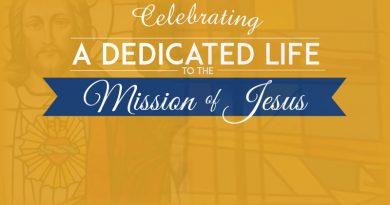Priests’ convocation: The prophet in your parish
Event brings priests together at DWC in Epworth June 17-19
By Rob Kundert
Special to The Witness
EPWORTH — Being a prophet is not about predicting the future. It is about teaching, listening and learning; questioning and rock-solid faith. It is about honest self-reflection and sincere prayer. It’s about truly being the Lord’s messenger to the people in the pews.
“A prophet is someone who delivers the word of God, but in addition, has a close and intimate relationship with God,” said Father John Kartje, PhD, rector/president of Mundelein Seminary in Chicago. He presented “Priest as Prophet” to the Archdiocese of Dubuque Priests’ Convocation June 17-19, at Divine Word College.
“Being a prophet is more than mastering the academic material and conveying it,” he said. “You have to make it part of who you are.”
Awarded a doctorate in astrophysics before pursuing the priesthood, Father Kartje went on to earn an advanced degree in sacred Scripture. Blending the intellectual approach of both the scientist and the theologian, he explored the intricacies of being a prophet with the 60 priests who attended the convocation. In a series of sessions, he focused on verses from the Book of the Prophet Jeremiah.
“We look at how God interacted with Jeremiah and say, ‘How can I better hear God’s word and proclaim it?’” he said.
The first session dealt with self-doubt. When God called Jeremiah to be his prophet, he didn’t want the job. He doubted himself so God reassured and encouraged him. The same can be true for a priest facing a new assignment or challenging times in his current one. The first step for him is to figure out his limitations.
“The priest does this first by going to prayer. Pray like Jeremiah prays, looking God in the eye and saying, ‘Here’s where I’m struggling,’” Father Kartje said. “You need to have that honest gut check with God.”
Then reach out to others, such as a spiritual advisor or trusted friends, those who are not afraid to raise issues that may be hard to discuss. Such conversations can help the priest to know himself better.

The next session focused on the unconditional love of the Father for Jeremiah. It is also a critical point for the priest to remember — God loves him unconditionally — because that love can be a source of peace and encouragement during difficult times.
A session dealt with betrayal. At one point, Jeremiah accused God of lying to him by overselling how easy his tasks with the Israelites would be. Jeremiah was angry with the Lord and swore he would never be his prophet.
“That’s Jeremiah. Boy, he pulls no punches with God,” Father Kartje said. “He goes out there, the mission is horribly received, he gets death threats, so he stares God down and says, ‘You tricked me!’”
A priest can also face times of disappointment or a sense of betrayal. Sometimes those situations are caused by misunderstandings, which over time only become worse. Perhaps, like Jeremiah, deep down the priest does not want the task he is assigned in the first place.
The lesson is that through prayer, spiritual direction and honest conversations with those he trusts, the priest can make his way through the struggle and get to truth, as Jeremiah did with the help of God.
Another session dealt with finding order out of chaos. As Father Kartje did periodically in his presentations, he showed an example from the scientific or natural world. In this case, a flock of birds was oriented on the ground, then suddenly rose in total disorder only to smoothly reorient themselves into a synchronized, whirling mass of unity.
The Israelites were oriented on a sinful path. Jeremiah shook them up with predictions of coming disaster, but also revealed a path that would reorient them back to righteousness.
“Jeremiah did that through his teaching. It was very disorienting to the people,” Father Kartje said. “Sometimes that is what the priest is called upon to do, to help people look within themselves, to see themselves as God sees them.”
The final session dealt with God’s promise to always be there.
“God lays it out to Jeremiah, ‘If you can work through your reluctance and to stay in this relationship, when you seek me you will find me,” Father Kartje said. “God is saying, ‘I’ve got this covered,’ but that is not always so easy to see, and parish priests can lose sight of that.”
Father Greg Bahl, chair of the committee that organized the priests’ convocation, said they try to offer opportunities for the priests to continue their formation as followers of Jesus.
“Being a prophet is not just taking church teachings and interpreting them,” he said. “Ultimately the goal is for us as priests to be more Christ-like, to take on the role of Christ the prophet.”
For Father Phil Gibbs, pastor of Resurrection Parish in Dubuque, the focus on intellectual formation hit home.
“It helps me reflect upon my calling as priest and as a harbinger of the word,” Father Gibbs said. “It also helps us all to be introspective, to explore some of our shortfalls and really focus on how Jesus is calling us to give witness to him through his word.”
Cover:
(Photo above, left): Several dozen priests from around the Archdiocese of Dubuque concelebrate Mass together during the priests’ convocation June 17-19 at Divine Word College in Epworth. Among them was Archbishop Michael Jackels (second row, far left).
Rob Kundert is a public relations specialist and writer for Divine Word College in Epworth.



